| Listing 1 - 10 of 20 | << page >> |
Sort by
|
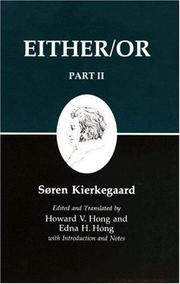
ISBN: 0691020418 0691020426 9780691020419 9780691020426 0691073155 0691073163 1299456448 1400846943 1299456456 1400846935 Year: 1987 Volume: 3-4 Publisher: Princeton (N.J.) : Princeton university press,
Abstract | Keywords | Export | Availability | Bookmark
 Loading...
Loading...Choose an application
- Reference Manager
- EndNote
- RefWorks (Direct export to RefWorks)
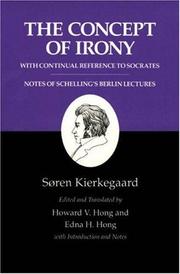
ISBN: 0691073546 0691020728 1400846927 129946209X 9780691020723 9780691073545 Year: 1989 Volume: 2 Publisher: Princeton University Press
Abstract | Keywords | Export | Availability | Bookmark
 Loading...
Loading...Choose an application
- Reference Manager
- EndNote
- RefWorks (Direct export to RefWorks)
A work that "not only treats of irony but is irony," wrote a contemporary reviewer of The Concept of Irony, with Continual Reference to Socrates. Presented here with Kierkegaard's notes of the celebrated Berlin lectures on "positive philosophy" by F.W.J. Schelling, the book is a seedbed of Kierkegaard's subsequent work, both stylistically and thematically. Part One concentrates on Socrates, the master ironist, as interpreted by Xenophon, Plato, and Aristophanes, with a word on Hegel and Hegelian categories. Part Two is a more synoptic discussion of the concept of irony in Kierkegaard's categories, with examples from other philosophers and with particular attention given to A. W. Schlegel's novel Lucinde as an epitome of romantic irony. The Concept of Irony and the Notes of Schelling's Berlin Lectures belong to the momentous year 1841, which included not only the completion of Kierkegaard's university work and his sojourn in Berlin, but also the end of his engagement to Regine Olsen and the initial writing of Either/Or.
Ironie --- Irony --- Sarcasm --- Cynicism --- Rhetoric --- Satire --- Tragic, The --- Understatement --- Schelling, Friedrich Wilhelm Joseph von --- Socrates --- Socrate --- Socrates Constantinopolitanus Scholasticus --- Schelling, Friedrich Wilhelm Joseph von, --- Schelling, F. W. J. --- Schelling, Friedrich Wilhelm Joseph --- Schelling, Federico Guillermo José --- Irony. --- Socrates. --- von Schelling, Friedrich Wilhelm Joseph
Book
ISBN: 9780691017372 Year: 1997 Publisher: Princeton (N.J.) Princeton University Press
Abstract | Keywords | Export | Availability | Bookmark
 Loading...
Loading...Choose an application
- Reference Manager
- EndNote
- RefWorks (Direct export to RefWorks)
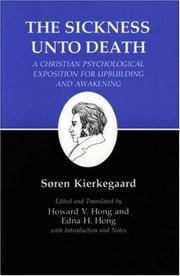
ISBN: 0691020280 1299453988 1400810043 1400816785 1400847028 Year: 1983 Volume: 19 Publisher: Princeton Chichester Princeton University Press
Abstract | Keywords | Export | Availability | Bookmark
 Loading...
Loading...Choose an application
- Reference Manager
- EndNote
- RefWorks (Direct export to RefWorks)
Book
ISBN: 0691020663 9780691020662 0691073686 140087436X Year: 1991 Volume: 21 Publisher: Princeton Chichester Princeton University Press
Abstract | Keywords | Export | Availability | Bookmark
 Loading...
Loading...Choose an application
- Reference Manager
- EndNote
- RefWorks (Direct export to RefWorks)
For Self-Examination and its companion piece Judge for Yourself! are the culmination of Søren Kierkegaard's "second authorship," which followed his Concluding Unscientific Postscript. Among the simplest and most readily comprehended of Kierkegaard's books, the two works are part of the signed direct communications, as distinguished from his earlier pseudonymous writings. The lucidity and pithiness, and the earnestness and power, of For Self-Examination and Judge for Yourself! are enhanced when, as Kierkegaard requested, they are read aloud. They contain the well-known passages on Socrates' defense speech, how to read, the lover's letter, the royal coachman and the carriage team, and the painter's relation to his painting. The aim of awakening and inward deepening is signaled by the opening section on Socrates in For Self-Examination and is pursued in the context of the relations of Christian ideality, grace, and response. The secondary aim, a critique of the established order, links the works to the final polemical writings that appear later after a four-year period of silence.
Philosophical anthropology --- General ethics --- Christian dogmatics --- Christian life --- Lutheran Church --- Lutheran Church. --- Kristet liv. --- Lutheran authors. --- Controversial literature. --- Danske folkekirke --- Danske folkekirke. --- Danske Folkekirke. --- Denmark. --- Controversial literature --- Lutheranism --- Christian sects --- Danske kirke --- Danske evangelisk-lutherske folkekirke --- Folkekirken (Denmark) --- Church of Denmark --- Lutheran authors
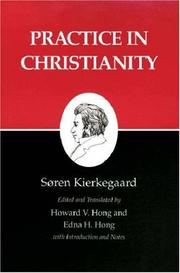
ISBN: 0691020639 9780691020631 0691073961 9780691073965 1299453996 1400847036 Year: 1991 Volume: 20 Publisher: Princeton Chichester Princeton University Press
Abstract | Keywords | Export | Availability | Bookmark
 Loading...
Loading...Choose an application
- Reference Manager
- EndNote
- RefWorks (Direct export to RefWorks)
Christian moral theology --- Christian dogmatics --- Atonement --- Christian life --- -Christianity --- -Grace --- Lutheran authors --- Psychology --- Christianity --- Religions --- Church history --- Christians --- Discipleship --- Religious life --- Theology, Practical --- Redemption --- Sacrifice --- Grace
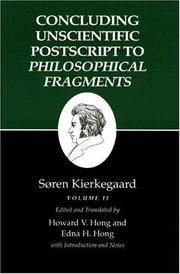
ISBN: 0691020817 0691073953 0691020825 9780691020815 9780691020822 9780691073958 9780691073958 0691020833 9780691020839 069107402X 1400847001 1299456421 1299454046 1400846994 0691140804 Year: 1992 Volume: 12 Publisher: Princeton Chichester Princeton University Press
Abstract | Keywords | Export | Availability | Bookmark
 Loading...
Loading...Choose an application
- Reference Manager
- EndNote
- RefWorks (Direct export to RefWorks)
In Philosophical Fragments the pseudonymous author Johannes Climacus explored the question: What is required in order to go beyond Socratic recollection of eternal ideas already possessed by the learner? Written as an afterword to this work, Concluding Unscientific Postscript is on one level a philosophical jest, yet on another it is Climacus's characterization of the subjective thinker's relation to the truth of Christianity. At once ironic, humorous, and polemical, this work takes on the "unscientific" form of a mimical-pathetical-dialectical compilation of ideas. Whereas the movement in the earlier pseudonymous writings is away from the aesthetic, the movement in Postscript is away from speculative thought. Kierkegaard intended Postscript to be his concluding work as an author. The subsequent "second authorship" after The Corsair Affair made Postscript the turning point in the entire authorship. Part One of the text volume examines the truth of Christianity as an objective issue, Part Two the subjective issue of what is involved for the individual in becoming a Christian, and the volume ends with an addendum in which Kierkegaard acknowledges and explains his relation to the pseudonymous authors and their writings. The second volume contains the scholarly apparatus, including a key to references and selected entries from Kierkegaard's journals and papers.
Christian apologetics --- Christian dogmatics --- Apologetics --- Christianity --- -Christianity --- Religions --- Church history --- Apologetics, Missionary --- Christian evidences --- Evidences, Christian --- Evidences of Christianity --- Fundamental theology --- Polemics (Theology) --- Theology, Fundamental --- Religious thought --- Theology --- Philosophy --- Evidences --- Apologetics. --- Subjectiviteit. --- Philosophy. --- -Philosophy --- -Apologetics --- History
Book
ISBN: 9780691140827 0691140820 Year: 2009 Volume: 24 Publisher: Princeton Woodstock Princeton University Press
Abstract | Keywords | Export | Availability | Bookmark
 Loading...
Loading...Choose an application
- Reference Manager
- EndNote
- RefWorks (Direct export to RefWorks)
Religion --- Authority --- Religionsfilosofi. --- Auktoritet --- Philosophy. --- Religious aspects. --- religiösa aspekter. --- Adler, Adolf Peter, --- Adler, Adolph Peter, --- Christian spirituality --- Philosophy --- Religiösa aspekter.
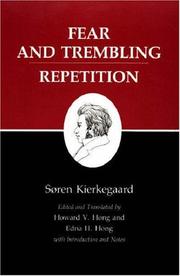
ISBN: 0691020264 9780691020266 069107237X 9780691072371 129946792X 1400846951 Year: 1983 Volume: 6 Publisher: Princeton Chichester Princeton University Press
Abstract | Keywords | Export | Availability | Bookmark
 Loading...
Loading...Choose an application
- Reference Manager
- EndNote
- RefWorks (Direct export to RefWorks)
Christianity. --- Repetition (Philosophy) --- Sin. --- Christelijke ethiek. --- Gehoorzaamheid. --- Repetition (Philosophy).
Book
ISBN: 9780691140742 069114074X Year: 2009 Volume: 10 Publisher: Princeton Woodstock Princeton University Press
Abstract | Keywords | Export | Availability | Bookmark
 Loading...
Loading...Choose an application
- Reference Manager
- EndNote
- RefWorks (Direct export to RefWorks)
Christian life --- Confession. --- Marriage --- Death --- Lutheran authors. --- Religious aspects --- Christianity.
| Listing 1 - 10 of 20 | << page >> |
Sort by
|

 Search
Search Feedback
Feedback About UniCat
About UniCat  Help
Help News
News